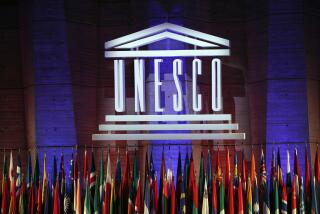U.S. Puts Off U.N. Ban on Cloning
- Share via
UNITED NATIONS — UNITED NATIONS -- As the General Assembly prepared for its annual debate on international conventions Thursday, the United States successfully delayed and diluted international agreements on human cloning and torture that it said infringe on its domestic interests.
The U.S. persuaded the U.N.’s legal committee to put off a vote on a global ban on human cloning for a year, saying that the proposed ban didn’t extend to research cloning and that it was better to have a stronger agreement later than an imperfect one today.
On a separate measure to allow international monitoring of prisons to prevent torture, the U.S. failed to stop a vote on what it considers a flawed protocol, but Washington is expected to water down its impact by blocking funding.
On the cloning issue, critics say that the U.S. approach would set back important research and that the delay on the ban will allow rogue scientists to proceed with plans to create cloned babies. France and Germany had urged the committee to act to halt reproductive cloning immediately and take up more controversial questions on cloning for medical research later.
The U.S. and 35 other countries backing its broader proposal disagreed.
“Can it be effective to have a partial ban?” said a U.S. official involved in the debate. “It’s impossible to differentiate an embryo created naturally or by cloning.” And even if it were possible, she asked, would enforcement mean forced abortions?
The official also said that a partial ban that permits embryonic clones to be created for research but forbids them to become babies legally requires the destruction of the embryos. Carolyn Willson, the legal advisor to the United States Mission to the United Nations, called that “a morally abhorrent prospect” in her statement to the legal committee earlier this year.
“Politically, it looks like a game of chicken,” said Robert George, a bioethicist from Princeton who has been advising the U.S. mission on scientific and ethical issues. “One side says we have to stop this now. We don’t have consensus on cloning for medical research, but we do for reproductive cloning, so let’s get that thing into place. The other side is saying, we would rather tolerate the creation of some human clones than go into the business of permitting an industry of embryo destruction.”
The push for a worldwide cloning ban began in August 2001, when an Italian embryologist, Severino Antinori, claimed that he had lined up 700 couples willing to take part in an experiment to create a cloned baby. An American colleague of Antinori’s, Panos Zavos, told a congressional hearing this year that work was ready to begin.
Though the year’s delay is a reprieve for scientists who work with stem cells from embryos, they worry that a universal ban would set back scientific breakthroughs in stem cell research on cures for Parkinson’s disease, leukemia and cancer.
Freda Miller, a Canadian scientist who discovered that adult stem cells harvested from skin can be prodded to do many of the same things that embryonic stem cells can, insists that her work should not be used as an argument to ban work with embryos.
“So much of what we know came from research on embryonic stem cells,” she told The Times last year. “The adult stem cells are promising, but we won’t know if they can replace embryonic stem cells for many years.”
The U.S. is one of about 130 countries that has ratified a 1989 U.N. treaty on torture, but it says that the provisions for monitoring prisons would infringe on states’ rights.
Amnesty International released a statement saying that the U.S. is demanding that funding for prison monitors come from national governments, not from the U.N. budget, nearly a quarter of which comes from the United States.
More to Read
Sign up for Essential California
The most important California stories and recommendations in your inbox every morning.
You may occasionally receive promotional content from the Los Angeles Times.













